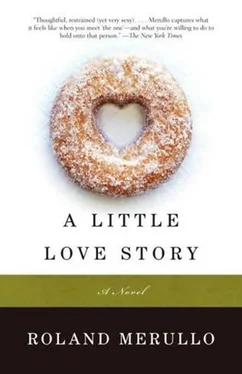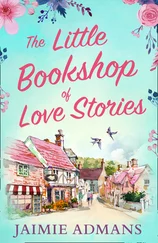“What’s that?” the trooper demanded, though even with the gentle knock and squeak of the dock hinges and even with the cars humming past on Memorial Drive, there wasn’t a chance in a thousand he hadn’t heard me.
“There are towels inside. Why don’t you get her one instead of making remarks like that?”
It was a very hard look he fixed on me then. I looked back at him. The boathouse lights made a small fuzz at the edges of his shoulders. “Pass that over,” he said to the BU cop, and he took my ID and marched up through the bays. We could hear his boots on the steps, then the heavy wooden front door slamming closed.
Janet was shaking slightly, dripping wet, still holding on to my arm. Given what our outing on the river had turned into, that gesture seemed like an act of generosity on her part. “If you go up to the landing and turn right, there’s the women’s showers,” I said to her. “There should be towels in there. No one will mind.”
When I was alone with the officer, a motorboat with a bow light went slowly past and I walked back down to where the double scull was floating and held it out at arm’s length so the wake wouldn’t knock it against the edge of the dock. There was water in the bottom of the boat, three or four inches from when the gunwale had dipped under Janet’s weight. When the wake died down I took the oars out and set them aside on the dock and tilted the shell toward me. I splashed out some of the water, but it was still too heavy to lift alone. The college cop came over and squatted down near me. He smelled like cigarettes.
“How’d you feel about helping me get this out of the water?” I said.
“Bad back.”
“Alright. Maybe the trooper will help.”
“He going to find anything there when he puts your name in the computer?”
“No.”
“Kind of a dumb remark, wasn’t it?”
“His or mine?”
“Yours.”
“Sure. I do that.”
“Kind of a dumb stunt, too.” He gestured toward the boat.
“You ever been out on the river at night?”
He shook his head. I thought of telling him about when I was a junior and a senior and we had gone out on the Charles in eights in the dark. The captain those years was pre-med, and so was I. We had an organic chemistry lab that went until four o’clock twice a week, so afterwards we’d hurry over to the boat-house and change and go out at four-thirty and by five-thirty it would be black dark. Coach Florent had a spotlight on his launch. He’d ride along next to us and shine the spotlight on you to see how your technique was, to see if you were coasting at all in the middle of the tough pieces. He had a bullhorn. “Entwhistle!” he’d yell in his high squeaky voice. “Down and away with the hands! Come on, John! Down and away. Then stand on the catch! STAND ON IT, GODDAMN IT!”
Sometimes the air temperature would be twenty degrees. A coat of ice would form on the shafts of the oars. But after you’d been rowing hard for a while, everything except the skin of your face would be warm, and sometimes we’d go down into the basin and do thousand-meter pieces there, invisible in the black, cold night. You’d feel like you had skidded off the edge of the predictable world and were just out there where no one and nothing could see you.
But I decided it wasn’t a story the officer would appreciate. I splashed some more water out of the boat with one hand and waited.
Soon we could hear the trooper’s boots on the stairs, and then on the dock. We stood up. The trooper handed my ID to the BU cop and said, “Do what you want.”
“Look,” I said, as he was turning away. “She’s sick. She was shivering. I wasn’t trying to be a wise-ass, you just-”
“She’s the governor’s slut,” he said at me, in a voice that was hard as a punch. “Everybody who’s been anywhere near him knows that. Used goods.”
He turned and marched toward the light. We heard him trotting up the stairs, and then we heard the door again, and then the sound of the cruiser engine as he accelerated.
JANET AND I MANAGED to tip and splash almost all the water out of the boat. Once it was up on our shoulders, the officer gave her a hand with some of the weight, and then helped us set it on the rack. He stood by without saying anything as I locked the bay doors, and then he followed us upstairs and I reset the alarm and turned out the lights. Janet had taken a hot shower but had to put the wet black dress back on, and then her dry sweater over it. She was coughing every fifteen seconds or so, and I worried that the dip in the Charles had taken her bad cold and turned it into pneumonia. Folded up in one hand she was holding her wet black panties and bra, and the officer could not keep his eyes from going there. He asked if we needed a ride. When we said we didn’t, he told us to stay out of trouble, and wished us a good night, and, after one last look at Janet and what she was carrying, got into his white and blue college police car and drove back over the bridge.
We walked across the four lanes of Memorial Drive and climbed into the truck. I kept a long-sleeved jersey there for days when Gerard and I got rained on, and for times, after work, when I didn’t want to walk into a sandwich shop or a bar all sweat and sawdust. I stepped out of the truck again and changed my shirt, but I didn’t put my good sport coat back on. We closed the windows and turned up the heat. It was hard to shake the chill.
“Everything go alright with the state police?” Janet asked, when we were driving over the bridge.
“Fine,” I said. “No problem.”
“He was on the State House detail a few times.”
I was trying hard but I could not think of a good next thing to say. We stopped in a short line of red taillights near the end of the bridge, and it seemed to me that I could feel the roadway trembling. We could have looped around to the left there, back toward Diem Bo, where I supposed Janet had parked, or we could have turned right, toward my apartment. When the light changed I went straight.
“Amazing,” I said finally, “how one jerkoff can sour a mood.”
Janet watched me across the seat. “And we were having such a nice time,” she said. “Swimming and everything.”
I laughed. I was just driving aimlessly and she knew it. We were trying to get back to the place we had been in Diem Bo but I wasn’t sure anymore how we had gotten there, and my being not sure made her not sure, I could feel that. All the nice liquid easiness that had been swirling between us had somehow hardened up and cracked.
For a few minutes we drove around on the back roads of Brookline in an awkward silence and then I turned, for no particular reason, onto Beacon Street and headed toward Coolidge Corner. She broke the silence: “Did you mean what you said at the restaurant? About being afraid of women’s bodies?”
“Terrified.”
“Is that something I could help you with?”
Joe Date would have made a cool remark then. “Absolutely,” he would have said. Or: “I was hoping you’d offer.” Or: “I’m willing to give it another try. It’s important not to let your fears rule you.” But in order to make remarks like that when you want to make them, your mind has to be focused right on the there and then, and mine wasn’t. We were not far from the building-a three-story, redbrick townhouse-where I’d first made love with Giselle, and I was upset at myself for taking that route on that night, for being the kind of person who let the past haunt him, distant and recent, who let the remarks of jerkoffs cut and stick like bits of grit in raw flesh. For an hour there in Diem Bo and afterwards I had slipped free of all that.
We were driving past 1178 Beacon Street and I was smelling the lemon laundry soap on the sheets and Giselle was standing by the half-open Venetian blinds with no clothes on. I had made love with a short list of other women by that point-in college and afterwards-but I had not ever felt anything like what I’d felt with her on that night. I’m not talking just about the physical feelings. I think what happens when you make love is that you communicate with the other person through a thousand secret channels. Every place your skin touches her skin is another little conversation. You can’t control those things the way you try to control a regular conversation; you can’t decide what to say and what to keep from saying. It’s as if the hair on your arms and the skin of your shoulders and the bones of your legs all carry different bits of your whole history there inside the cells. Everything that has happened to you, every thought and feeling and hope and sorrow, it’s all stored there. When you put your body against someone else’s body the cells can’t help but talk to each other, see where they match up and don’t, make billions of calculations as to where your histories and dreams speak a common language, what might be the chances of a happy life for the two of you and your as yet unborn child. It’s biological, I think, and more than biological, part of the whole mysterious package that makes a pregnancy, or a friendship. That night, with Giselle, all the conversations were carried on without translation-at least it felt that way. In fact, later that same night I dreamt she had gotten pregnant, in spite of everything we were doing to prevent it. In time there would be other kinds of lovemaking. Our dreams and visions would veer off into sulky solitudes, but on that night I’d felt, for a while, that we weren’t completely separate souls, and that is not a feeling you forget.
Читать дальше












